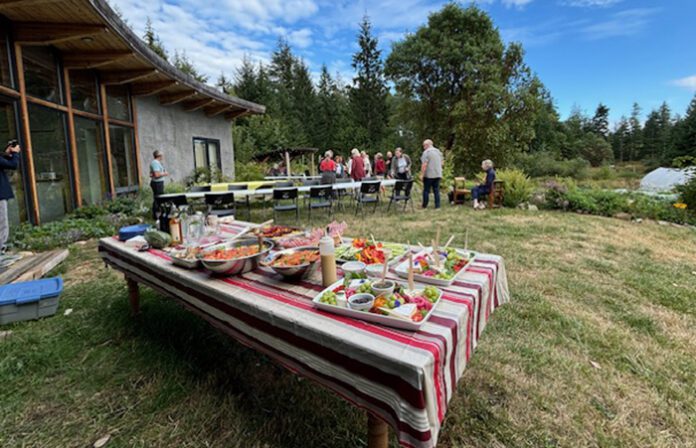By GRACE WAMPOLD and HEATHER PICOTTE
NFN Co-coordinators
Neighbours Feeding Neighbours (NFN) is a new initiative on Salt Spring Island focusing on food sovereignty to strengthen our community’s food security in times of emergency.
Food sovereignty means having control over the food we produce, access and consume. Practices that increase food sovereignty empower local farmers and communities to decide how to grow, share and manage food. Launched in May 2024, NFN is working to connect local farms with community members and develop strategies to ensure access to food during emergencies, such as floods, fires or storms.
Our changing climate brings more extreme weather, from longer, hotter dry seasons to intense atmospheric rivers. Many of these disruptions can be linked to industrial agriculture, which depletes soil, pollutes water and degrades the air we breathe. Salt Spring Island has felt the impact of record-breaking heat and rainfall. However, practical steps can increase resilience at home and in our neighbourhoods.
At Home: Growing and Storing for Emergency Food Security
One way to prepare for emergencies is to grow versatile foods that can be stored long-term. Growing your own food supports food sovereignty by giving you more control over what you eat. Start small — focus on a few of your favourite plants that do well in your space. Beans are an excellent choice for beginners because they enrich the soil and don’t require extra fertilizers, as they naturally add nitrogen. If you can’t garden due to location or physical limitations, don’t worry — Salt Spring Island is home to many skilled farmers growing food for the community.
Drying is one of the best ways to preserve foods — it retains their nutritional value while making them lightweight, easy to store and long-lasting. Beans and other legumes (like lentils and peas) are easy to dry and can be used in multiple ways: soaked and cooked, ground into flour, sprouted into greens, or saved as seeds for future planting. During stressful times, having nutritious food on hand is essential — legumes also help balance stress levels to keep us healthy in a crisis. Buying beans from the store is also relatively inexpensive, given their excellent nutrition. In an emergency, a simple pantry stocked with beans, rice and clean water could mean the difference between hunger and survival.
In the Community: Sustainable Farming for Health
Local small-scale farmers lead the way in sustainable practices, growing nutritious food while regenerating the environment. An NFN survey found that over 70 per cent of local farmers regularly test their soil and water to ensure quality. Nearly all of the 13 surveyed farmers have implemented soil conservation techniques to prevent erosion during extreme weather, and over half use water catchment and drip irrigation systems for their crops. These efforts are essential to keeping our food system strong, especially in the face of climate challenges.
Organic, small-scale farming improves soil health by increasing organic matter, which stabilizes the soil and reduces the risk of disasters like landslides or wildfires. It also creates habitats for wildlife, contributing to a more balanced ecosystem. This approach forms a positive cycle: the more we grow and eat local plants, the healthier our environment becomes, and the better prepared we are for unpredictable events.
It’s easy to overlook the challenges our local farmers face in supporting the community’s food needs. Small-scale organic farming is an investment in the health of the soil, the environment and consumers but often comes at the expense of farmers’ own financial stability. There’s a saying: “Do you know how to make a small fortune as a small farmer? Start with a large fortune.” By choosing to eat more locally grown produce, we can support small-scale farmers and contribute to a more resilient food system that benefits everyone.
Learn More, Get Involved
To learn more, visit the NFN website at nfnsaltspring.org, where you can explore a farm map and database organized by neighbourhood, helping you connect with nearby farms practicing regenerative agriculture.
NFN also encourages community members to participate in farm visits and neighbourhood assessments to improve emergency preparedness and foster relationships with the local food system. NFN project coordinators aim to assess and enhance emergency preparedness in our community, both locally and on farms. The goal is to build relationships, highlight good farming practices, and increase the overall preparedness of our community by promoting food growing, preserving and storing in every neighbourhood, so we all have access to food and water in emergencies.
By working together, we can build a more resilient, sustainable and sovereign food system that will serve us well now and in the future.
This article is part of Transition Salt Spring’s Lighter Living Initiative.
Transition Salt Spring invites you to sign up for more free access to Lighter Living content at tinyurl.com/Lighter-Living. Learn how to take low-effort actions that feel good, benefit our community and help the planet.

